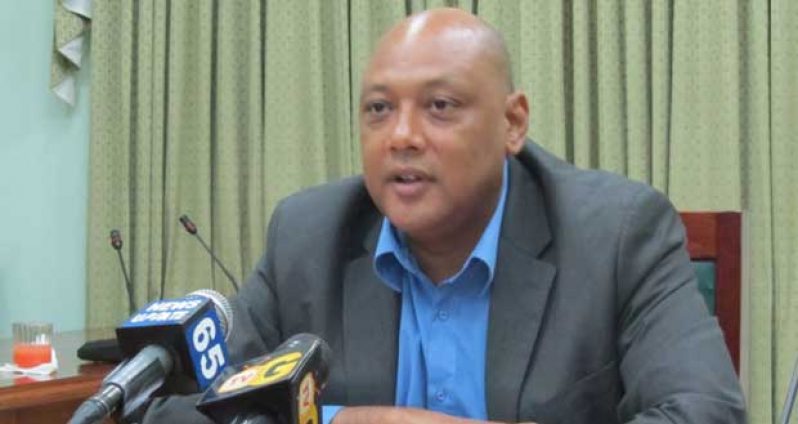Finance Minister to go before Privileges Committee
–to answer charge of infringement
THE Speaker of the National Assembly, Mr. Raphael Trotman, yesterday ruled that Finance Minister, Dr. Ashni Singh, should appear before the Parliamentary Privileges Committee, following a Motion from A Partnership for National Unity (APNU) Shadow Finance Minister, Mr. Carl Greenidge.

Trotman, in his ruling, said, “Having regard to all the facts and circumstances above, it is my considered opinion that the issue of the spending by the Honourable Minister of Finance does raise sufficiently serious questions of privilege such that the Committee of Privileges should enquire into.
“I therefore find that a prima facie case has been made out and the matter is referred to the Committee of Privileges.”
The combined Opposition contends that Minister Singh violated the law by spending monies that were disapproved of during the 2014 Budget debates. The spending was reflected in a $4.6B Statement of Excess tabled in the National Assembly on June 19 last by the Finance Minister.
‘Having regard to all the facts and circumstances above, it is my considered opinion that the issue of the spending by the Honourable Minister of Finance does raise sufficiently serious questions of privilege such that the Committee of Privileges should enquire into’ – Speaker of the House, Raphael Trotman
This financial paper is the fourth Statement of Excess since the start of the 10th Parliament in 2012, and is yet to be considered by the House at the next sitting. It reflects spending from January 1, 2014 to June 16, 2014.
The Speaker noted that these sums, for which approval is being sought, included expenditures that were not authorised by the National Assembly with respect to Article 217 of the Constitution.
The Article states that: “(1) No moneys shall be withdrawn from the Consolidated Fund except – “(a) to meet expenditure that is charged upon the Fund by this Constitution or by any Act of Parliament; or “(b) where the issue of those moneys has been authorised by an Appropriation Act; or (c) where the issue of those moneys has been authorised under article 219.
“(2) Where any moneys are charged by this Constitution or any Act or Parliament upon the Consolidated Fund or any other public fund, they shall be paid out of that fund by the Government of Guyana to the person or authority to whom payment is due.
“(3) No moneys shall be withdrawn from any public fund other than the Consolidated Fund unless the issue of those moneys has been authorised by or under an Act of Parliament.
“(4) Parliament may prescribe the manner in which withdrawals may be made from the Consolidated Fund or any other public fund.”
NOT A DETERMINATION OF GUILT
While the Finance Minister relies on Article 218 (3) (b) as the legal basis for the expenditure, Trotman noted that it is not his role as Speaker to determine “guilt” or “innocence”, but only to determine whether, “on the face of” the complaint, there is sufficient evidence to warrant a probe by the Committee of Privileges.
Said he: “It is not the preserve or function of the National Assembly, whether acting as a whole, or in part, through its Committee of Privileges, to determine whether there has been a breach or misinterpretation of the Constitution as regards the spending.
“It cannot escape comment however that the wording of Article 218 (3) (b) appears to contemplate a situation so grave and critical that it was not contemplated and provided for in the annual budgetary estimates; a situation, which in my considered opinion, would be akin to an outbreak of war, or the occurrence of some unimaginable natural disaster.”
He also noted that the following are facts that are not in contention:
* The budget was presented and dealt with in accordance with the Ruling of the Hon. Chief Justice (Ag.) dated January 29, 2014.
* The Honourable Minister of Finance adopted the Committee of Supply’s recommendations for “amendments” to the Estimates and amended the Estimates accordingly. This was done when he reported to the House after the Committee of Supply’s review.
* The National Assembly approved Appropriation Bill No. 10 of 2014, as amended by the Minister of Finance, and as presented by the Hon. Minister.
* His Excellency the President subsequently assented to the Appropriation Bill. This then became an Act of Parliament (No. 10 of 2014); giving authorisation for spending from the Consolidated Fund.
* The Honourable Minister of Finance caused spending to be done that was outside of the sum approved by the Act of Parliament No. 10 of 2014.
* The facts and circumstances of these withdrawals from the Consolidated are clearly distinguishable from those that occurred in 2012 and 2013 for the reason being that in 2014, the National Assembly, though aggrieved by the Chief Justice’s decision of January 29, 2014, sought to comply in spirit and in letter. The cause for the accusation of “unlawful or unconstitutional” action on the part of the Assembly when it amended the budget was removed.
“Standing Order 32 of the Standing Orders and Rules of the National Assembly states that the Speaker’s duty is to determine whether or not there is prima facie evidence that there has been either a breach of the privilege of a Member of the National Assembly, or whether there has been Contempt of Parliament committed by the spending,” Trotman reiterated.
(By Vanessa Narine)




.jpg)








